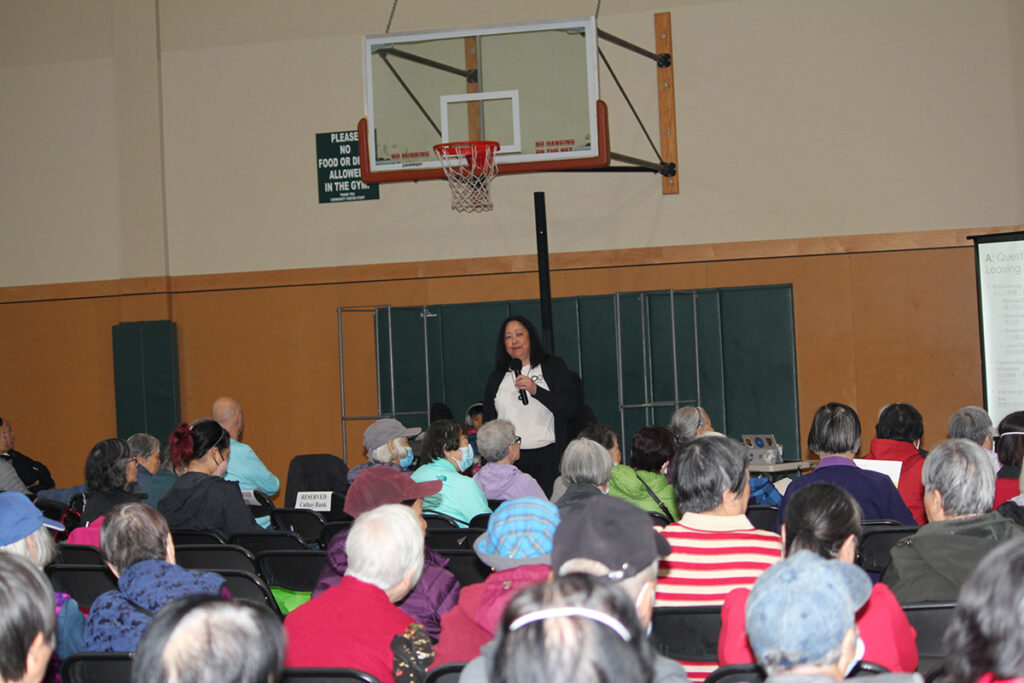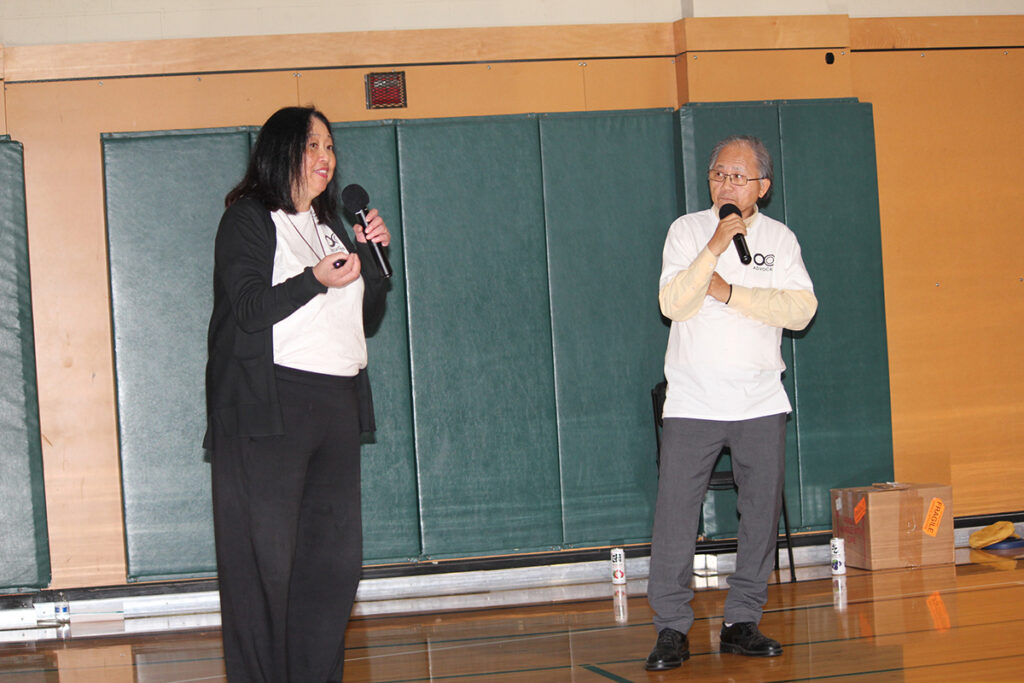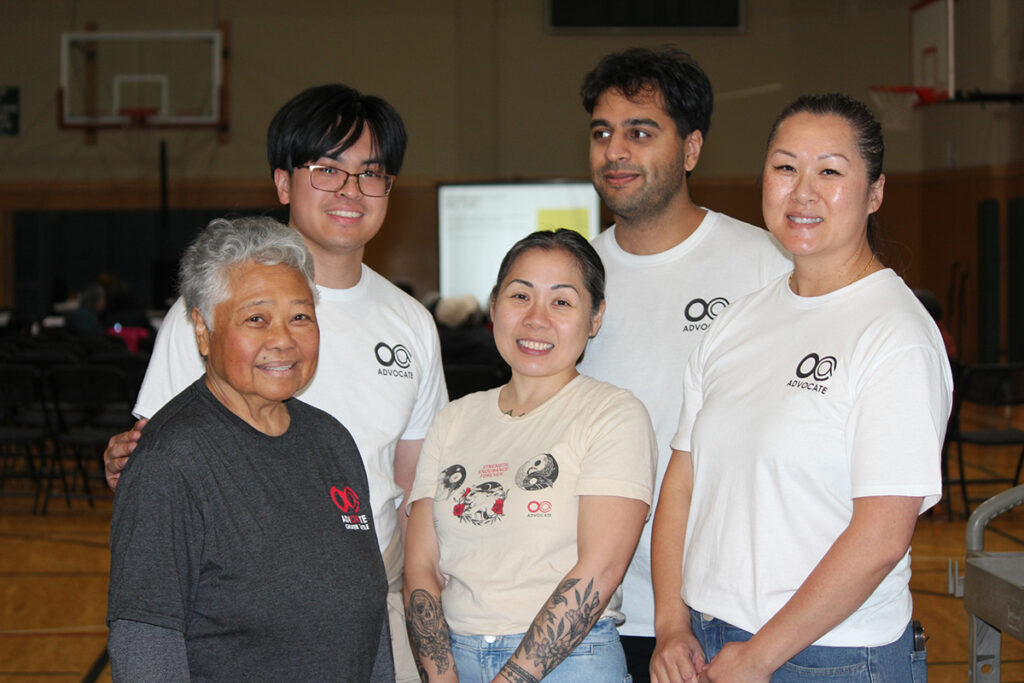By James Tabafunda
NORTHWEST ASIAN WEEKLY
Public safety in the Chinatown-International District (CID) takes an important step forward with a targeted educational campaign. More than 100 elderly residents and their family members gathered on Nov. 15 at the International District/Chinatown Community Center for CID Cares, a community safety program for one of Seattle’s most vulnerable populations.

Connie So presents information in safety pamphlet titled “With Love for Our Grandparents & Seniors” in English (Photo by James Tabafunda)
OCA-Asian Pacific American Advocates of Greater Seattle distributed a bilingual safety pamphlet titled “With Love for Our Grandparents & Seniors” and goodie bags to seniors from International House, New Central Apartments, and the Chinese Baptist Church in Beacon Hill.
Rising fraud targeting older Americans
The event comes as Asian American seniors face vulnerability to consumer fraud and scams. Nearly 39% of Asian Americans and Pacific Islanders age 50 and older report that they or family members have experienced fraud schemes, with victims losing an average of $15,000, according to 2018 AARP research. Non-financial impacts affect 72% of fraud victims, including anger, stress, difficulty sleeping, and fear.
A vulnerable population in the CID
The CID is home to a significant residential population, with seniors representing a substantial demographic within the neighborhood. Amy Chen Lozano, OCA-Greater Seattle treasurer and event co-organizer, said many of these seniors are “non-English speakers.”
A September 2024 study commissioned by The Asian American Foundation (TAAF) found that nearly two in five Asian American, Native Hawaiian, and Pacific Islander residents living in Seattle had been victims of anti-Asian incidents in the past year. The study revealed that 30% of respondents reported verbal attacks, 24% were harassed or threatened, and 20% were physically attacked.
Residents of the CID were more likely to report having personally experienced an anti-Asian incident, with 47% saying they had been victimized compared with 33% of those living in other areas of Seattle. Nearly one in three Asian Americans, Native Hawaiians, and Pacific Islanders in Seattle said they personally feared being attacked.
Community response through CID Cares
The event is supported by a coalition of organizations, including Cathay Bank, University of Washington (UW) American Ethnic Studies, Historic South Downtown, Seattle Department of Neighborhoods, Seattle Department of Parks and Recreation, and International District Emergency Center. Free tickets for the event were distributed at the Chinese Information and Service Center (CISC).
“It’s really important to have any type of event that can help people understand their safety needs,” said Denise Colvin, Seattle Department of Neighborhoods community capacity and safety manager. “I love that this event is targeted for seniors. … I think this is a fantastic event, definitely something that we want to continue and sponsor whenever we can.”
Comprehensive scam prevention guide
The pamphlet addresses an extensive range of scams targeting Chinese and Asian American seniors, including phishing and billing scams, hostage scams, phone scams, deposit scams, lottery scams, cash-on-delivery scams, immigration scams, international scams, and health scams.

Connie So (left) with Choy Vong, Cantonese interpreter and ESL teacher. (Photo by James Tabafunda)
In the midst of increased Immigration and Customs Enforcement arrests, immigration scams have increased, according to Connie So, a professor in the American Ethnic Studies department at the UW and event co-organizer. She led the presentation with Cantonese interpreter and ESL teacher Choy Vong.
Chinese communities have been targeted by so-called “blessing scams,” where fraudsters convince elderly victims to place money and valuables in bags for spiritual cleansing, then switch the bags and steal the contents.
The San Francisco District Attorney’s Office stated in a 2024 public awareness campaign that “blessing scams are essentially bait-and-switch schemes primarily targeting monolingual Chinese women.”
So explained the origin of the pamphlet, which was developed after years of requesting law enforcement agencies to create bilingual materials.
It was finalized with help from UW American Ethnic Studies interns and consultations with police departments, insurance agencies, and Asian American health agencies.
Violence and physical assault on seniors
According to Stop AAPI Hate data, one out of four incidents involving Asian American adults aged 60 and older were physical assaults, compared to 15.4% for those under 60. Physical assaults accounted for 26.2% of hate incidents against Asian American elders aged 60 and older, with 36.7% occurring on public streets.
In 2024, 29% of older Asian Americans surveyed were direct victims of anti-Asian hate, with 55% reporting loneliness, 38% reporting anxiety, and 36% reporting depression, according to a 2024 study published by the Journal of the American Geriatrics Society.
Community attendance and support
Chen Lozano, a first-generation immigrant from Guangzhou, China, said attendance at this year’s event was lower than previous years.
“Our events have traditionally brought out a lot of seniors,” she said. “The first year we held the event, we had around 350. And then we had 660 last year based off our giveaways. And then this year, unfortunately, we were a little bit delayed with the rain and just all the hectic schedules.”

From left: Felicita Irigon, OCA-Greater Seattle honorary adviser; Dylan Hartono, OCA-Greater Seattle co-president; Theressa Irigon-Rachetto, OCA-Greater Seattle board member; Harman Hans, OCA-Greater Seattle board member-at-large; Amy Chen Lozano, OCA-Greater Seattle treasurer and event co-organizer. (Photo by James Tabafunda)
“This is also not just to educate them with just the pamphlets that we have, but the volunteers that we have are also Asian American students from the University of Washington,” said Theressa Irigon-Rachetto, an OCA-Greater Seattle board member. “It gets the community involved in helping, especially from the Asian community. We want to protect our community. We want to protect our elderly.”
One safety program in the CID
The event occurs as Seattle has operated the CID Ambassadors Program, launched in June 2025 with $1 million in combined funding from the City of Seattle, TAAF, and Amazon. It deploys paid staff to patrol the neighborhood from 2 p.m. to 10 p.m. seven days a week.
Seattle Mayor Bruce Harrell announced the program in May 2025 to address ongoing challenges around public safety in Chinatown, Japantown, and Little Saigon.
The ambassadors walk and watch over neighborhood blocks to ensure they are safer, cleaner, and cared for while providing a visible, welcoming presence by providing directions, assisting visitors, and reporting issues. They assist the CID’s small businesses by deterring disruptive behavior, responding to quality-of-life concerns, and helping business owners and entrepreneurs access city services and support networks. They also offer de-escalation and engagement services to individuals, acting as trained “community-first” responders to help restore peace and dignity to public life in the CID.
The program has handled over 300 calls for service with a reported five-minute response time.
Language barriers and vulnerability
Language barriers and unfamiliarity with the U.S. financial system make Asian American elders particularly vulnerable to scams. According to AAPI Data, Asian Americans are the only racial group that is majority foreign-born, with two-thirds of Asian Americans born outside the U.S., meaning English is likely a second language for many.
Irigon-Rachetto stressed the importance of providing information in languages that seniors can understand. She said, “As far as our seniors and the challenges that they’re facing, especially during this time, this is about giving them that information for their safety printed in the language that they can understand.”
The pamphlet addresses comprehensive personal security measures through four chapters: situational awareness, safety at home, scams, and victimization support. The situational awareness chapter covers safety protocols before leaving home, as you leave your home, when outside, as you walk, traveling in a car, leaving your car, traveling on public transit, at banks and shopping locations, and procedures if you are being followed.
The pamphlet acknowledges that if individuals are feeling traumatized by experiences, they should seek out help. It notes there is nothing to be ashamed of, as many people are experiencing issues with mental health, and it is helpful to talk about it.
Support services available
In Seattle, agencies including the CISC and Asian Counseling and Referral Service (ACRS) provide mental health support. The CISC, established in 1972, serves more than 20,000 immigrants and their families throughout King County annually. ACRS, founded in 1973, promotes the wellbeing and empowerment of Asian Americans, Native Hawaiians, Pacific Islanders, and other underserved communities, with more than 300 multilingual staff members fluent in over 40 languages.
About OCA-Greater Seattle
OCA-Asian Pacific American Advocates, founded in 1973 as the Organization of Chinese Americans, is a national nonprofit dedicated to advancing the social, political, and economic wellbeing of Asian Americans, Native Hawaiians, and Pacific Islanders. The Greater Seattle chapter was established in 1995 and has twice been named Chapter of the Year (2003 and 2004) by the national organization.
Chen Lozano emphasized the organization’s commitment to supporting vulnerable seniors.
“The biggest message we want to spread to people is we’re aware of the fact that our seniors are vulnerable,” Chen Lozano said. “They are the most marginalized community here, and they’re very important, and we haven’t forgotten about them. … We’re here to support them.”
Long-term plans
“Right now, we’re doing it in Chinese (Cantonese with assistance in Mandarin), and we’re going to do Vietnamese and Korean next, and then some other languages,” So said.
For more information on OCA-Asian Pacific American Advocates of Greater Seattle, go to ocaseattle.org.
